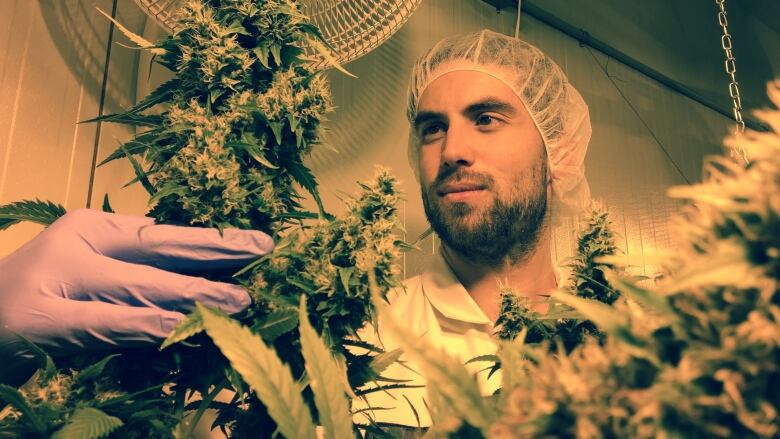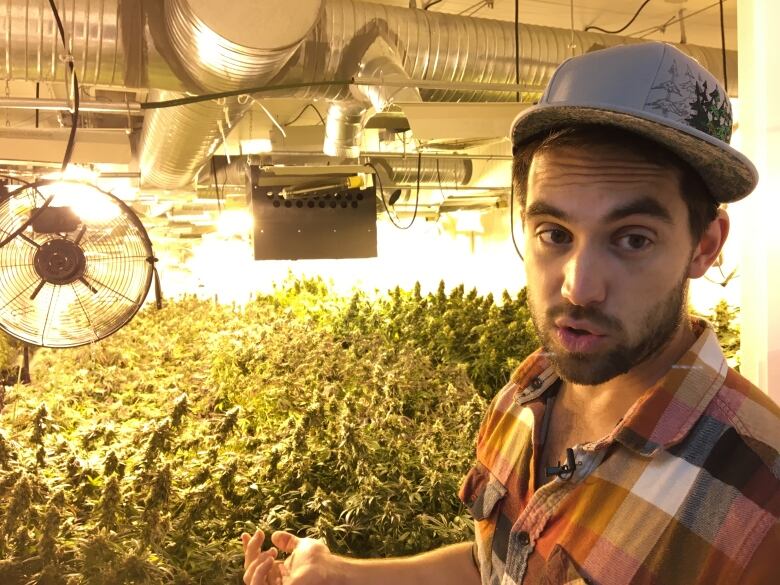Organic pot grower living the dream in Whistler
29-year-old the lead agronomist for a Whistler marijuana company

As a 14-year-old loading soil at a Quebec poinsettiagreenhouse, David Bernard-Perronnever would have expected he'd grow up to be the lead agronomistfor a marijuana company in Whistler.
But at 29, that's exactly what he's doing, and the company he works for is at the forefront of quickly growing industry.
- Vancouver Cannabis expo shows breadth, growth of Canadian marijuana industry
- Medical marijuana patients can grow 'limited amount' of cannabis at home under new laws
- ANALYSIS:Marijuana research not reaching Canada's toking teens
Bernard-Perron says the poinsettia job can be credited with getting him interested in plant sciences, but even as a student working on a masters degree inorganic agriculture at McGill University, he wasn't especially interested in cannabis. He barely had any experience working with it, and he didn't count himself as a recreational user.
"The only time that I've worked with cannabis sativa ...was while I was helping a friend doing her masters project on industrial hemp. She was growing a field a test field on McGill University land," he said. "I helped her one day in the field."
Industrial hemp strains are grown for their fibre strength. The stuff Bernard-Perron now grows in Whistler is carefully raised for its therapeutic properties and shipped directly to registered medical marijuana patients across the country.

Whistler Medical Marijuana Corporationclaims to be the world's first certified organic medical marijuana producer.
"We might not have been the first to grow organic weed in the world,"saidBernard-Perron. "But we're the first to have it certified by an independent third party body to put their stamp on the production, like, 'yes, your flowers and oil are certified organically grown."
WMMC's organic certification comes from the FraserValley Organic Producers Association and it's based on international standards.
"I know some of the other companies have some of the strains are grown organically, I don't know if their whole production is organic," said Bernard-Perron.
Pesticides common in pot sold as medicine
A report published last week in the Globe and Mailrevealed that the majority of marijuana samples fromunregulatedVancouver-area dispensariescontained contaminants whentested by a Health Canada-accredited lab.
Documents obtained under the Access to Information Act show that of the 22 samples tested, only five passed Health Canada quality standards. Twelve of the samples contained the pesticide carbamate, which is not approved for use on marijuana.

"There's not a lot of knowledge about how to use pesticides that have been developed in cannabis production," said Bernard-Perron.
"I think for public safety, I think it's very important to grow even if it's not organic to grow without pesticides," he said. "All those pesticides have been developed for products that either weren't ingested, or 'wash before use,' or products that won't build up in the green part of the plants."
"With cannabis you're going to be vaporizing the product directly into your lungs and that's a way faster and more efficient delivery method, so if you have pesticide residues or full on pesticide that have been sprayed on your crop, that will get directly into your blood stream."
Road to Whistler
According to Bernard-Perron, it was complete luck that led him to his job pushing the bounds of organic marijuana production.
"That's pure happenstance, actually," he said, explaining that he would often travel to the West Coast during the summer months while he studied at McGill. He would take advantage of the area'srock climbing, biking and hiking.
In 2014 he got in touch with one of the rock climbers he met three years earlier and learned that he had just started WMMC. The friend invited him to check out the facility in Whistler, and the prospect of an agronomist job surrounded by world-class recreation and rugged wilderness drew him in.

"It's a very nice place to work, especially when you finish your day and there's a really nice alpine glow in the mountains. You feel like you're working in the right spot," he said.
'We're paving the ground'
WMMC is one of 35 authorized licensed producers in Canada. The Whistler facility grows about 1,000 plantsand produces up to 500 kilograms each year.
Health Canada reports that more than 4,000 kilograms of dried pot was produced in the last reported quarter (Jan. to March 2016). There were53,649 patients registered at the time, consuming an average of 1.03 grams per day. Nine months earlier, there were fewer than half that many registered patients.
WMMCis hoping to cash in on the growing marketand market its organic products for those concerned about things like pesticides.
"We're paving the ground, nobody did what we did before, so this is what's been very interesting for us, developing those very unique growing process and figuring out what the plant really needs on a scientific level," he said.

The company is about to start selling 'grow at home' kits based on Bernard-Perron's techniques. Last month Health Canada announced patients could grow their own marijuana something the former federal government had stopped.
And then there's the looming legalization of all marijuana.Health Minister Jane Philpottannounced in April that legislation can be expected in spring 2017.
"I think that we're really into something and we'll be in very unique options if ever the market opens with legalization," said Bernard-Perron.
"I'm trained to grow any plant, but I'd like to stay in [the pot]field because it's very interesting. It's a very exploding field right now and we'll see where it takes us."
Follow Rafferty Baker on Twitter: @raffertybaker












_(720p).jpg)


 OFFICIAL HD MUSIC VIDEO.jpg)
.jpg)



























































































